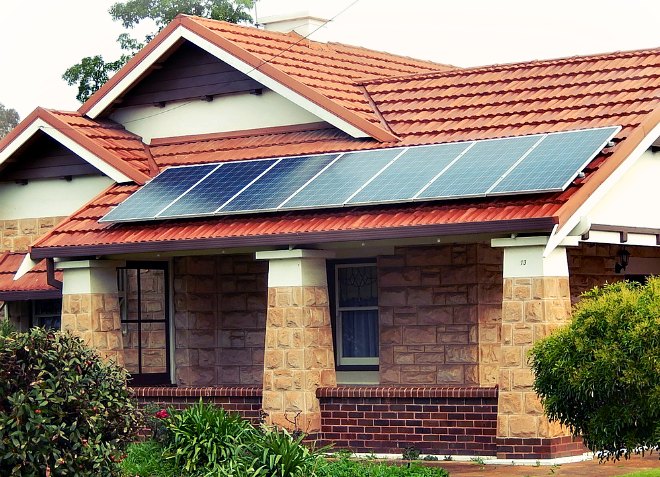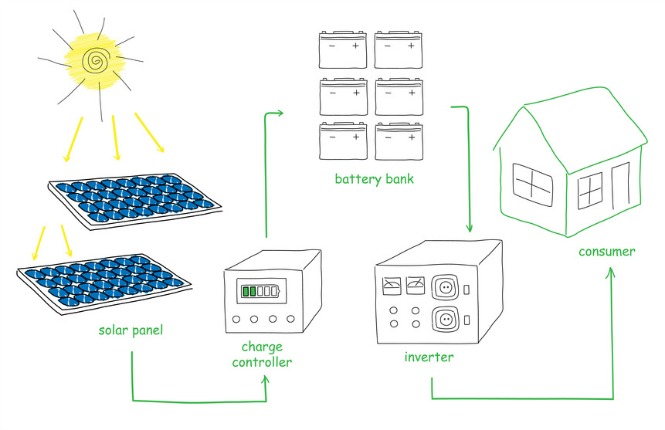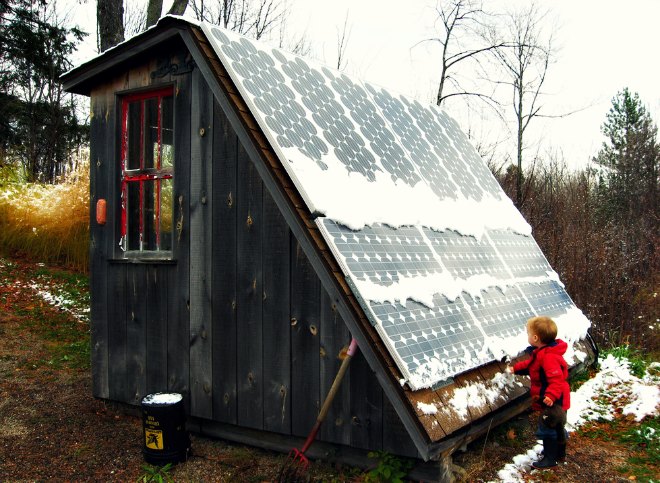Thinking about putting solar panels on your roof? While it’s usually overcast or rainy here in the Northwest, solar panels can still give you a lot of benefits. I’ll give you the high-level bullet points and then dive into more detail on each one:
- Lower your electricity bill (or eliminate it completely)
- Use a renewable energy source
- Reduce pollution
- Feel good about helping the environment and creating domestic jobs
- Get one step closer to living off the grid, if you’re into that
Sounds pretty good, right? Now let’s take a more in-depth look at each benefit of solar panels so you know what you’re getting into.
 Photo: Michael Coghlan
Photo: Michael Coghlan
Solar Panels Save (And Make) You Money
When light hits silicon solar panels, or photovoltaics, it creates electricity. As soon as you or a roofing expert installs solar panels and hook them up to your electric panel, your electricity bill is going to start shrinking. Solar panels can save you some serious money. On average, homeowners save $20,000 in the 20 years after getting solar panels. There are even financial incentives to help you with the initial cost.
The more solar panel units you use, the more free energy you’ll get. (And contrary to rumor, solar panels do work when it’s cloudy.) “In the cloudy areas of Oregon, you can expect to generate about 1,000 kilowatt hours for every one kilowatt of system size you install,” Oregon’s official solar guide says.
With enough clear, sunny days, some people get more solar power than their home needs. That’s when you can start selling that power to the utility companies. Yes, you can actually make money off of your solar panels! At least in some places. Calculate your potential savings here. Finally, solar panels will raise your property value.
Solar Is a Renewable Energy Source
Here in Oregon, we’re lucky. We get almost half of our electricity from hydroelectric power, or dams. The rest is gas and coal, with a little bit of wind and nuclear. Most of the time, you get electricity by burning oil, gas, and coal — fossil fuels that will run out one day. Solar power, on the other hand, can theoretically provide electricity as long as we have sunlight.
Solar Panels Make the Air Cleaner
Other energy sources like oil and gas have to be dug up, refined, and transported — all of which has an environmental toll. Whereas all you need with solar panels is the sun shining on your roof! Yes, manufacturing solar panels creates some waste and pollution, but that’s a one-time thing, and it’s ultimately way less detrimental to our air quality than shipping oil to America from the Middle East.
You Can Feel Good About Using Solar
You should feel proud about using solar power for several reasons. Without getting too political, you’re reducing America’s reliance on imported oil and gas from other countries. Plus, it creates jobs here in the U.S., like for the people who install and service your solar panels. It’s a win-win.
Photo: Peter Blanchard
Solar Panels Make You More Independent
Power companies are bought and sold, but nobody owns the sun. And unlike fossil fuels, it’s never going to run out. If you want to be as self-reliant as possible, or if you’re worried about disasters, solar panels are the way to go. They especially appeal to people who want to get off the grid, whether you own a tiny house or want to be prepared for an emergency. Solar panels work on or off the grid. If you want to be off the grid, you’ll need batteries to store solar power for when it’s dark, as well as a backup system, like a generator or wind turbine.
Get Solar Panels
Sold on solar? It’s pretty great! You can install solar panels yourself, but it can be tricky, and you have to have the right permits. At Fivecoat Roofing, we can advise you about the best size and placement of solar panels on your roof to maximize how much electricity you get. Give us a call at (503) 481-3699 or email us, and we’ll help you figure out your options!
Further Reading
Oregon Solar Power Guide



